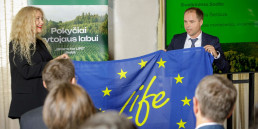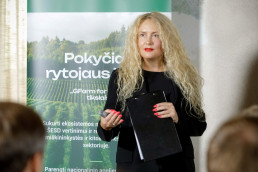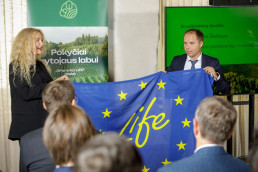Ten national partners will carry out the GFarm for LIFE project in accordance with the European Commission’s aim of creating a climate-resilient future. Participants in the project’s official launch event on September 20 at the Senators’ Passage discussed the chance for Lithuania to stand out in Europe by achieving the project’s goals: creating a framework for a national carbon sink certification and monitoring system, as well as creating a more effective GHG assessment and registry model for the agriculture, forestry, and other land use sectors.
Although the energy sector has the worst environmental effects, 20–24% of world emissions come from agriculture, forestry, and other land use. The same sector, which includes all of a country’s land used for agriculture, is essential for mitigating climate change since it absorbs GHGs through soil, biomass, and wood.
The strategic goals that GFarm for LIFE partners has established will contribute to increasing the effectiveness of this procedure in Lithuania. The project’s success is anticipated to serve as a model for identifying approaches to more sustainable land management and enhancing sector resilience at the European level.
“LIFE is the EU’s main umbrella programme to promote action on the environment and climate. Lithuania is a leader in the climate change priority, as we are partners in 27 out of 44 projects. GFarm for LIFE’s theme of addressing the challenges of agriculture is unique among them all. These are truly great achievements that raise the bar for even more ambitious action and deserve to be proud of the work we have already done,” said Kęstutis Šetkus, Deputy Minister of Environment, in his welcome speech, and highlighted the Ministry’s focus on the project as a project of great importance at both national and European level.
GFarm for LIFE will be coordinated by the cluster and the digital innovation center, AgriFood Lithuania. Project partners: National Paying Agency (NPA), the State Forest Service, Vytautas Magnus University, the Lithuanian Forest and Land Owners Association (LMSA), JSC ART21, JSC Dojus AGRO, JSC Litagra, JSC Melda, and JSC Strategy LABS.
“We frequently collaborate with foreign partners on worldwide projects, but this is a rare case where everyone involved is from Lithuania. Consequently, the national consortium will have the chance to influence European policy recommendations. Furthermore, the participation of such significant institutions as universities, the agrifood sector, forestry, and the companies that support innovation in these sectors demonstrates that Europe has confidence in us for a good reason. I am confident that a constructive partnership will help to achieve the best results”, said Kristina Šermukšnytė-Alešiūnienė, Director of AgriFood Lithuania, sharing the project’s prospects.
All participants in the discussion agreed that this initiative represents exceptional potential for Lithuania. The development of a trustworthy GHG credit certification process and registration platform that can be used throughout Europe is being done in collaboration with public agencies, non-profit organizations, academia, and business. Most importantly, the partners regard this activity as long-term, high-impact national cooperation rather than just a project that produces methodology and IT tools.
The budget of almost €2.7 million is supported and partly financed by the Ministry of the Environment of the Republic of Lithuania, with the European Commission contributing 60% of the funds. GFarm for LIFE will run for 3 years.




